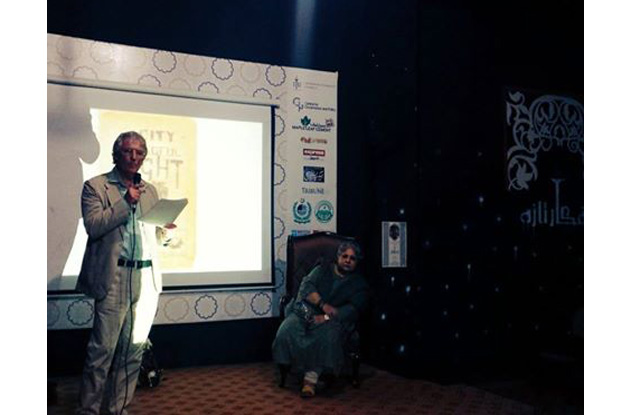
Speaking about the Kiplings in Lahore, former NCA principal Nazish Attaullah and writer Charles Allen on Friday discussed the contributions of John Lockwood Kipling and Rudyard Kipling to Indian society.
They were speaking at a session held on the first day of Afkar-i-Taza. Attaullah, a former NCA principle, said Lockwood had founded the Mayo School of Arts—the original name of the NCA—in 1857. She said the sculptor had set up a renowned ceramics workshop at the school. Of the sculptures made by him, Attaullah said, two were still on display at the office of the NCA’s principal. She said he had also been commissioned to travel across the Indian subcontinent to make portraits of and document people involved in creating indigenous crafts.
“Apart from being a gifted teacher who possessed a vision for the art school, he was also a writer who documented the life in and culture of India in his book the Rudyard Jungle Book,” Attaullah said. She said he had also edited a journal on Indian art and industry which was significant as it was often used as an architecture catalogue. Attaullah said he had encouraged his students to fashion items that could be used universally. She said this had culminated in a fusion of art pieces.
Allen, the author of Kipling Sahib: India and the making of Rudyard Kipling, spoke in detail about Rudyard. Allen said Rudyard was just another teenager not too enthusiastic at the prospect of leaving England for a job in India and joining his parents.
Unable to fall asleep in the scorching city, he said, Rudyard took to walking at night. Allen said this led him to the Walled City, a place where not many British men had set foot earlier. He said their interest in Lahore was confined to where they lived.
“His wanderings transformed his impressions of the city. From (seeing it as) a dark and dusty city brimming with diseases and peculiar religious practices (he began to) simply love Lahore and that is how The City of Dreadful Nights began taking shape,” he said.
Allen said considering that Rudyard was a teenager, he began to make sense of Lahore through his interaction with courtesans of the red light area. “That is how his perception of the city’s culture and religious practices underwent a transformation,” he said. Allen said this was a young man who broke taboos by writing about sex and people who were the underdogs of the era.
Through his writings, he said, Rudyard began bringing attention to peasants’ and servants’ issues. Allen said one of the things he detested was the treatment meted out by the natives to their women. “At the Queen’s Golden Jubilee in 1887, instead of writing on her, Rudyard composed a poem about the sufferings of Indian peasants,” he said.
Published in The Express Tribune, April 2nd, 2016.










1732012115-0/Untitled-design-(14)1732012115-0-270x192.webp)






COMMENTS
Comments are moderated and generally will be posted if they are on-topic and not abusive.
For more information, please see our Comments FAQ